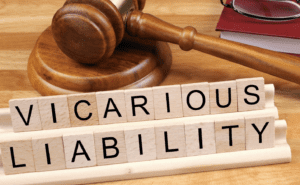What is Vicarious Liability?
Vicarious liability, also known as imputed liability, is a legal principle that holds one party responsible for the actions of another. In the context of employer-employee relationships, it means that an employer can be held legally responsible for the actions of its employees while they are acting within the scope of their employment, regardless of whether the employer approves of or agrees with the employee’s actions. This principle applies to various situations, including instances of harassment, accidents, and injuries.
The rationale behind vicarious liability is that the responsible party, in this case, the employer, should have the ability to control the actions of the person committing the act. By imposing liability on employers, it encourages them to implement measures to ensure that their employees behave responsibly and within the boundaries of the law while carrying out their job duties.
To determine if vicarious liability applies, there are three questions that need to be considered:
- Has harm been caused?
- Was the harm caused by an employee? There must be a recognised relationship between the employer and the wrongdoer, justifying legal responsibility for the actions of the employee.
- Was the employee acting within the scope of employment? There must be a connection established between the employment and the wrongful act, where the act must be reasonably related to the authorised conduct by the employer.
If the answer to all these questions is “yes,” then the employer could be held liable.
This means that the company will be responsible for compensating the victim for the harm they have suffered. Compensation may include medical expenses, lost wages, pain and suffering, and other damages resulting directly from the wrongful actions of the employee. In severe cases, the court may also award punitive damages to punish the company for the actions of its employees and to serve as a deterrent.
In cases where the actions of the employee involve criminal conduct, the company may also face criminal charges.
“In the course of employment” refers to the time when an employee is actively engaged in the duties and responsibilities assigned by their employer. This includes tasks explicitly assigned by the employer as well as activities that are reasonably connected to the employee’s role. If there is a sufficient link to the work or employment of the employee in question, the employer can be held liable.
For example, if an employee is involved in a work-related task or is on the employer’s premises during regular working hours, their actions during that time are considered to be “in the course of employment.” Additionally, case law has shown that employers can sometimes be liable for incidents outside of the workplace, such as during the commute to and from work or at social events like Christmas parties.
The difference between full liability and vicarious liability lies in the parties held accountable. Full liability means that a party is solely responsible for its own actions or omissions that directly cause harm or damage. Vicarious liability, on the other hand, holds one party responsible for the actions of another. In the context of an employer-employee relationship, vicarious liability refers to the employer being held responsible for the actions of its employees.
Vicarious liability is important because it ensures that individuals harmed by workplace incidents have a means to seek compensation, as responsibility is allocated to the party with greater control and resources—the employer. By holding organisations accountable, employers are encouraged to prioritise and enforce robust safety measures, fulfil their duty of care, prevent negligence, and contribute to the overall welfare of the workforce.
Vicarious liability primarily applies to health and safety incidents but can also extend to other areas of employment.
- Bullying and Harassment: Employers can be held accountable for failing to prevent or address bullying or harassment in the workplace.
- Discrimination: If an employee discriminates against a colleague or a third party while performing work-related tasks, the employer may be held liable for the discriminatory actions.
- Illegal Activity: Employers may be held responsible for the consequences of an employee’s illegal actions if they failed to take reasonable steps to prevent or address such behaviour.
It’s important for employers to understand vicarious liability and take appropriate measures to prevent and address misconduct by their employees.
A proactive obligation to prevent workplace sexual harassment – anticipated by October 2024
Upcoming is the introduction of the new Worker Protection Act. This means it will be mandatory for employers to implement reasonable measures to prevent sexual harassment in the workplace as per legal requirements.
Your employees will have the right to file formal complaints with the Equality and Human Rights Commission if they observe a lack of preventative actions on your part.
This implies that you may need to substantiate your proactive measures even in the absence of any claims or allegations against you.
Failure to provide evidence of preventive actions could result in significant financial penalties, with tribunals authorised to increase compensation awards by up to 25%.
Tick HR Solutions support employers with risk management including issues of vicarious liability.

